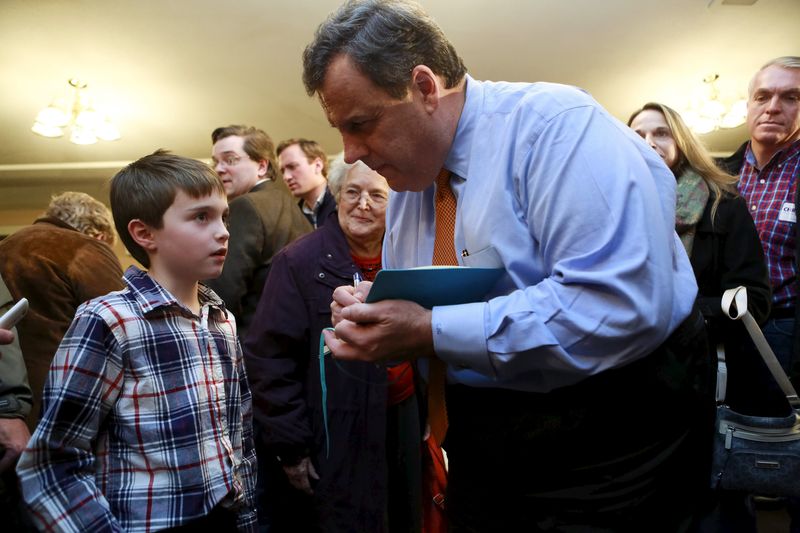By Hilary Russ
NEW YORK (Reuters) - Away from home for more than half of the past year, New Jersey Governor and Republican presidential candidate Chris Christie gives a State of the State address on Tuesday facing many of the stubborn problems that plagued his state before he began his run for the White House.
A nearly broke transportation fund, high home foreclosure rates and a severely hobbled state pension system persist.
But Christie likely will not mention those thorny issues when he takes a short break from his campaign to return home and address the state legislature, unless it is to point the finger at the Democrats who lead it.
The speech comes on the cusp of the presidential primaries leading up to the November 2016 general election. Christie is pinning his hopes on the nation's first primary election, on Feb. 9 in New Hampshire, where he has spent many days in recent weeks but is still trailing several other contenders.
Even if Christie wins the Republican nomination, he might not win his own left-leaning state, which has voted for Democrats in the last six consecutive presidential elections, since 1992.
New Jersey's transportation trust fund is only bringing in enough cash to cover debt and old projects, not to fund new ones. The home foreclosure rate is nearly three times the national average, and the pension system is only 44 percent funded.
Just 33 percent of New Jersey registered voters approve of Christie's performance, according to a December Rutgers-Eagleton Poll.
His critics "will snipe regardless of the significant initiatives launched and accomplishments achieved during his term, including the past year," Christie spokesman Brian Murray said in an email to Reuters, adding that Christie on Tuesday would discuss "how he will continue his robust agenda in the months to come."
On Tuesday, Christie is likely to play up job growth or other accomplishments, political analysts said. He could talk about the state's unemployment rate, which has dropped to 5.3 percent in November, nearly on track with the nation's 5.0 percent rate, and about how he has championed efforts to combat drug addiction.
Such speeches in New Jersey have historically taken a broad, positive tone, and Christie might not gain nationally in his quest for the White House by addressing New Jersey's problems.
"He hasn't been here to reinforce the accomplishments and he's not going to be staying around long enough following the speech to reinforce whatever new things he wants to promote," said Ben Dworkin, a political scientist at New Jersey's Rider University.
Christie was out of state for 190 full and partial days in 2015, or 52 percent of the year, his administration confirmed. Including trips to neighboring New York and Pennsylvania, the total rises to 261, according to The Wall Street Journal.
Christie has remained in constant communication with his administration, spokespeople have said
Other governors have surely left home while campaigning for president, including a fellow Republican contender, Ohio Governor John Kasich.
But in New Jersey, the state constitution makes the governor extremely powerful. The governor is the only statewide elected official and appoints a wide range of public officials. The governor wields four kinds of vetoes and alone certifies the amount of revenue the state can use for budgeting.

"There's only one person who can force everybody into a room and emerge with a deal," Dworkin said. "And that's the governor."